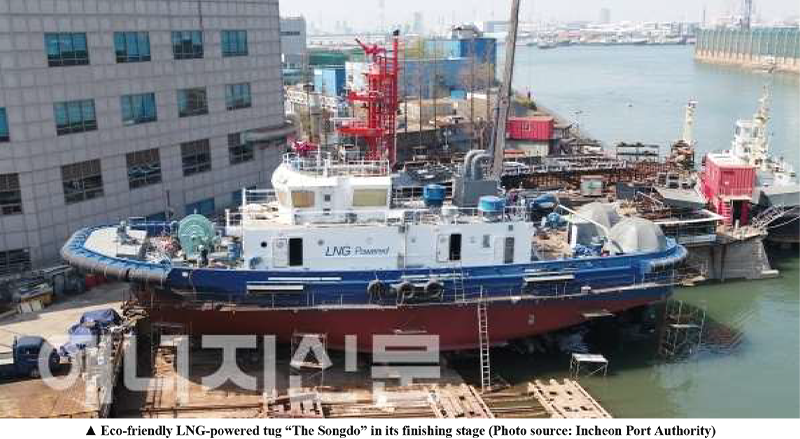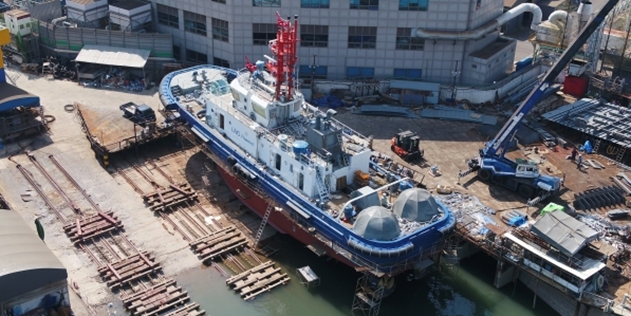- About Us About Us
- Business Business
- Sustainability Management Sustainability Management
- PR Center PR Center


Korea’s first LNG-powered tug, “The Songdo”(formerly The Baengnyeong), will begin commercial operation in earnest in the second half of 2021.
Korea Gas Marine Transport, the ship’s operating company, announced on the 14th of this month that as construction of its LNG tug “The Songdo”had reached its finishing phase, the vessel’s commissioning would be continued until June, following the launching ceremony in late May,with commercial operation commencing in earnest during the second half of the year.
Tugs are ships that assist with docking by pushing or pulling large ships entering or leaving a port.
The Incheon Port Authority, entrusted with management of the Ministry of Oceans and Fisheries’ “Old Tug LNG Fuel Conversion Project”, selected Korea Gas Marine Transport as business operator in Sept. 2019, for Korea Korea GaLNG tug conversion.
The LNG fuel-powered tug “The Songdo” is the first of its kind in Korea.
It is a new model 324-ton-class LNG tug, 37m long and 10m wide,with 5,000hp creating running speeds up to 14.0KTS(25.9km per hour).
Of the total construction cost of 9.1 billion KRW, 1.7 billion KRW worth of national subsidies(1.4 billion from the MOF and 300 million from the IPA), accounting for roughly 20 % of the total cost, was provided to spur development of eco-friendly ships.
According to the Incheon Port Authority, ships converting from heavy oil to LNG can effectively reduce air pollutants – NOx by 90.2%, SOx by 100%, CO2 by 24.3% and PM by 94%.
Korea Gas Marine Transport signed a construction contract with DH Shipyard in Incheon in March last year, with KMS, a domestic ship design company, participating in the construction of “The Songdo”.
Hyundai Heavy Industries’ Himsen Engine was chosen for the project instead of the Japanese engines commonly used in most tugs.
DongHwa Entec’s LNG fuel supply system was installed on the vessel, which contributed greatly to localization of parts.
Senior Vice President Kim Ga-yeong of Korea Gas Marine Transport stated, “Its completeness as a domestic model has been increased by using domestic equipment and materials up to maximum 80%, excluding only those materials for which local production is impossible.
We have secured performance and quality that match those of overseas companies, with clear advantages in terms of long-term maintenance and repair, outstanding A/S assurance and timely delivery of materials.

◆Construction of three LNG tugs is underway The successful construction of Korea’s first LNG-powered tug,“The Songdo”, is gaining widespread attention as it serves not only as a compass for determining the direction of Korea’s small eco-friendly ship market, but also as a starting point from which Korea can advance into the global small eco-friendly ship market.
There are only ten LNG fuel-powered tugs currently in service around the world, meaning that successful construction and operation of Korea’s first LNG-powered tug, “The Songdo”, will define Korea’s ability to make inroads into the global small eco-friendly ship market.
Tug LNG conversion is a national project recommended by the government to address the International Maritime Organization(IMO)’s tightened ship fuel emissions restriction.
Tugs are heavy diesel-powered ships whose radius of coverage lies within harbor limits.
Despite their small size, tugs discharge relatively large quantities of greenhouse gas emissions as they use high-powered engines to pull or push large ships, which can require urgent corrective measures.
However, though there is currently consensus in the Korean tug industry on the need for preemptive response to the tightened ship emissions restrictions, in fact, there is still hesitation over construction of LNG-powered tugs.
This is because the investment required is comparatively large compared to that of previous vessels in the same class.
Further, although there are national subsidies available, shipbuilders lack experience in the domestic construction and operation of LNG-powered tugs.
There are three LNG-powered tugs currently being constructed in Korea: Korea’s first LNG fuel-powered tug,“The Songdo”, scheduled for operation in Incheon Port; Korea Marine Environment Management Corporation’s 500 ton-class eco-friendly LNG-powered water surface cleaner tug (combined with tugging function), scheduled for its completion in the first half of 2022; and an LNG fuel-powered tug under construction by ship operating company Heunghae Co., Ltd. According to the LNG tug feasibility study conducted by the Ulsan Port Authority in 2018, the construction cost for LNG-powered tugs is 30∼50% higher than that for other diesel-powered ships, which translates into a significant burden on tug companies.
It was also pointed out that the domestic shipbuilding industry requires development of LNG-related ship materials and additional related technology.
In particular, the study showed that development of LNG-powered ships would be feasible if the government, local governments and port authorities were to provide subsidies amounting to about 30% of construction costs, to lessen the excessive burden on tug companies: subsides including partial ship cost, secondary compensation, exemption of acquisition and registration tax and port facility charge reduction.
The tug industry’s related personnel said, “In the situation in which construction cost is much higher than that of the same class diesel engine tugs and without experience in their operation, there is a great burden involved in construction of new LNG-powered tugs. I will examine conversion to LNG-powered tugs while taking a close look at how the government and related organizations provide subsidies and how successfully they are operated in the future.”
Another tug industry representative said, “More aggressive support from the government is required to fulfill the government’s own fine dust reduction goals and realize carbon neutral ports.
They will need to consider incentives such as additional points to companies operating eco-friendly ships or higher fees paid for eco-friendly tugs during tug-related bidding.
” Source: Energy Newspaper (http://www.energy-news.co.kr)





